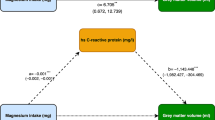Abstract
Type 2 diabetes mellitus (T2DM) is a known cause of cognitive dysfunction, and brain-derived neurotrophic factor (BDNF) is a key protein in promoting memory growth and survival of neurons. However, the relationship between plasma BDNF and diabetic cognitive dysfunction is still elusive. A total of 89 patients over 60 years with T2DM and 40 well-matched health controls were enrolled. All participants received a set of multi-dimensional neuropsychological tests for the cognitive assessment. The subjects were divided into amnesic mild cognitive impairment (aMCI) and non-aMCI groups. An enzyme-linked immunosorbent assay (ELISA) was used to measure plasma BDNF concentrations for all subjects. No significant difference was found between T2DM patients and healthy control in MMSE scores. The T2DM patients performed significantly worse in four cognitive domains (including episodic memory, executive function, visuospatial function, and information processing speed) compared with the controls (all p < 0.05). The prevalence of aMCI in T2DM population was higher [OR = 4.032 (1.536~10.582), 37/89–6/40]. Additionally, the plasma concentration of BDNF in T2DM patients was significantly lower than that in controls (p < 0.01). However, no significant correlation was found between plasma BDNF and cognitive function in T2DM. Our results suggested that T2DM have a higher prevalence of cognitive impairment. The plasma BDNF concentration in T2DM patients was significantly lower than that in controls, but low BDNF was not a biomarker for cognitive dysfunction in T2DM patients.
Similar content being viewed by others
References
Biessels GJ, Staekenborg S, Brunner E, Brayne C, Scheltens P (2006) Risk of dementia in diabetes mellitus: a systematic review. Lancet Neurol 5(1):64–74
Ahmed S, Mahmood Z, Zahid S (2015) Linking insulin with Alzheimer's disease: emergence as type III diabetes. Neurol Sci 36(10):1763–1769
Medhi B, Chakrabarty M (2013) Insulin resistance: an emerging link in Alzheimer’s disease. Neurol Sci 34(10):1719–1725
Gispen WH, Biessels GJ (2000) Cognition and synaptic plasticity in diabetes mellitus. Trends Neurosci 23(11):542–549
Bornstein NM, Brainin M, Guekht A, Skoog I, Korczyn AD (2014) Diabetes and the brain: issues and unmet needs. Neurol Sci 35(7):995–1001
Hu Y, Russek SJ (2008) BDNF and the diseased nervous system: a delicate balance between adaptive and pathological processes of gene regulation. J Neurochem 105(1):1–17
Yamada K, Nabeshima T (2003) Brain-derived neurotrophic factor/TrkB signaling in memory processes. J Pharmacol Sci 91(4):267–270
Schindowski K, Belarbi K, Buée L (2008) Neurotrophic factors in Alzheimer’s disease: role of axonal transport. Genes Brain Behav 7(Suppl 1):43–56
Krabbe KS, Nielsen AR, Krogh-Madsen R, Plomgaard P, Rasmussen P, Erikstrup C et al (2007) Brain-derived neurotrophic factor (BDNF) and type 2 diabetes. Diabetologia 50(2):431–438
Nitta A, Murai R, Suzuki N, Ito H, Nomoto H, Katoh G et al (2002) Diabetic neuropathies in brain are induced by deficiency of BDNF. Neurotoxicol Teratol 24(5):695–701
Passaro A, Mari E, Dalla Nora E, Marcello C, Di Vece F, Sanz JM (2008) Brain derived neurotrophic factor (BDNF) levels in elderly subjects with different forms of cognitive impairment and with or without type 2 diabetes. Nutr Metab Cardiovasc Dis 18(Suppl 1):S53–S54
Zhen YF, Zhang J, Liu XY, Fang H, Tian LB, Zhou DH et al (2013) Low BDNF is associated with cognitive deficits in patients with type 2diabetes. Psychopharmacology 227(1):93–100
Suwa M, Kishimoto H, Nofuji Y, Nakano H, Sasaki H, Radak Z et al (2006) Serum brain-derived neurotrophic factor level is increased and associated with obesity in newly diagnosed female patients with type 2 diabetes mellitus. Metabolism 55(7):852–857
Boyuk B, Degirmencioglu S, Atalay H, Guzel S, Acar A, Celebi A et al (2014) Relationship between levels of brain-derived neurotrophic factor and metabolic parameters in patients with type 2 diabetes mellitus. J Diabetes Res 2014:978143
Petersen RC, Doody R, Kurz A, Mohs RC, Morris JC, Rabins PV et al (2001) Current concepts in mild cognitive impairment. Arch Neurol 58(12):1985–1992
Shu H, Shi Y, Chen G et al (2016) Opposite neural trajectories of apolipoprotein E ϵ4 and ϵ2 alleles with aging associated with different risks of Alzheimer’s disease. Cereb Cortex 26(4):1421–1429
Croxson SCM, Jagger C (1995) Diabetes and cognitive impairment: a community-based study of elderly subjects. Age Ageing 24(5):421–424
Szémán B, Nagy G, Varga T, Veres-Székely A, Sasvári M, Fitala D et al (2012) Changes in cognitive function in patients with diabetes mellitus. Orv Hetil 153(9):323–329
Tapia-Arancibia L, Aliaga E, Silhol M, Arancibia S (2008) New insights into brain BDNF function in normal aging and Alzheimer disease. Brain Res Rev 59(1):201–220
Passaro A, Dalla Nora E, Morieri ML et al (2015) Brain-derived neurotrophic factor plasma levels: relationship with dementia and diabetes in the elderly population. J Gerontol A Biol Sci Med Sci 70:294–302
Karege F, Schwald M, Cisse M (2002) Postnatal developmental profile of brain-derived neurotrophic factor in rat brain and platelets. Neurosci Lett 328(3):261–264
Navarro-Martínez R, Fernández-Garrido J, Buigues C et al (2015) Brain-derived neurotrophic factor correlates with functional and cognitive impairment in non-disabled older individuals. Exp Gerontol 72:129–137
Demir M, Gürol AO, Özyiğit RT, Üresin AY (2016) Effects of blood pressure lowering with different antihypertensive agents on cognitive function and plasma brain-derived neurotrophic factor levels: a comparative study. J Cardiovasc Pharmacol 67:538–543
O'Bryant SE, Hobson V, Hall JR, Waring SC, Chan W, Massman P et al (2009) Consortium brain-derived neurotrophic factor levels in Alzheimer’s disease. J Alzheimers Dis 17(2):337–341
Palleria C, Leporini C, Maida F, Succurro E, De Sarro G (2016) Arturi F, et al potential effects of current drug therapies on cognitive impairment in patients with type 2 diabetes. Front Neuroendocrinol 42:76–92
Acknowledgements
This research was partly supported by the National Natural Science Foundation of China (No. 81271218) and Jiangsu Province Natural Science Foundation of China (No. BK2012746).
Author information
Authors and Affiliations
Corresponding author
Ethics declarations
Conflicts of interest
The authors declare that they have no conflict of interest.
Rights and permissions
About this article
Cite this article
Ren, QG., Chang, JH., Lu, WJ. et al. Low plasma BDNF is not a biomarker for cognitive dysfunction in elderly T2DM patients. Neurol Sci 38, 1691–1696 (2017). https://doi.org/10.1007/s10072-017-3048-9
Received:
Accepted:
Published:
Issue Date:
DOI: https://doi.org/10.1007/s10072-017-3048-9




